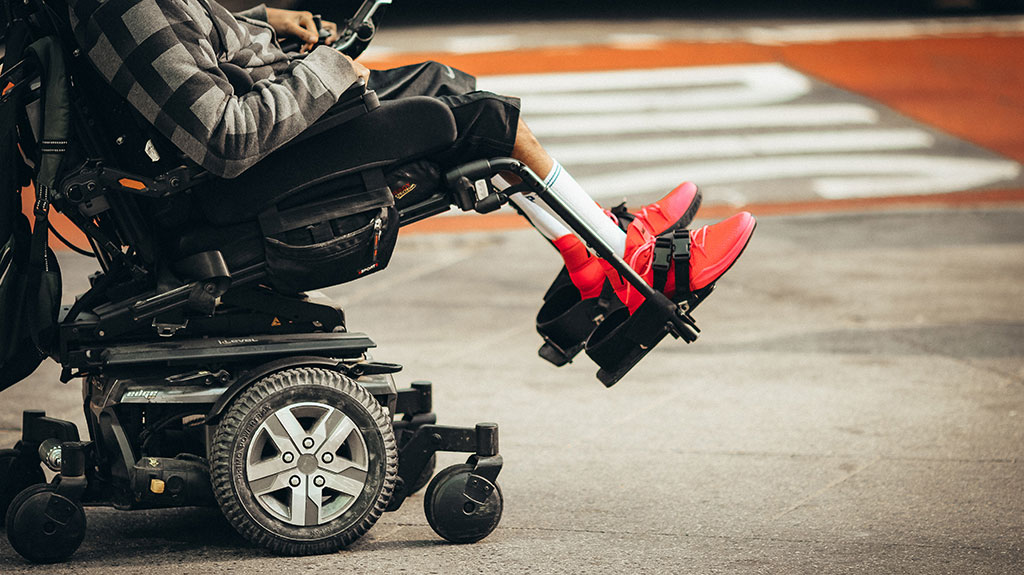Almost 2,000 students with certified disabilities have chosen the UOC
Seven out of ten students with disabilities would recommend the UOC as a university that can cater to people in this group
3 December is International Day of Persons with Disabilities. The UOC is one of Spain's leading universities when it comes to the number of students with disabilities. According to a survey conducted in 2018, 66.03% of these students would recommend the UOC as a university that is able to cater to people in this group.
In the academic year 2020/2021, the UOC had 1,944 students with certified disabilities enrolled, as well as others with specific educational needs or learning disorders. In the first semester of this academic year, most of the queries received by the help service have been related to adaptations for the needs of people with dyslexia. This is followed by queries from students with visual or auditory sensory disabilities and, finally, by mental health queries.
According to Marc Romero, programme director in the field of digital competencies and member of the Faculty of Psychology and Education Sciences, "our University provides accessibility measures that facilitate inclusion. These range from a virtual campus that is mostly compatible with support tools (such as zooming tools and screen readers, among others) to accessible learning resources or special conditions for taking final tests". Sílvia Mata from the student help service added that "the UOC's learning model itself is already considered inclusive and accessible: each student can choose their own pace of work and log in from home whenever it suits them."
In addition to this, Mata highlighted some of the specific learning adaptation initiatives put in place at the University: "The Library works hard to ensure the accessibility of the majority of learning resources, for example by adding subtitles to videos, creating audio books and making sure that PDFs can be read out by specific voice software. The help service team is also carrying out a variety of specific support protocols and systems based on supporting students throughout their time at the UOC." But, according to Romero, "there is still a long way to go, because there are still some cases in which we cannot provide fully adapted support." In order to improve the support given to these students, a functional diversity working group was established last academic year in cooperation with the Globalization and Cooperation department as part of the effort to reduce the Access Gap under the UOC's plan for the digital transformation of its education.
What difficulties do they face?
Each person is different and experiences their disability in a different way. In addition, the problems they encounter are very varied but, according to Romero, "the most common one is having to deal with an environment that is not adapted to their needs, which leads them to seek external resources. Another important matter is how they are viewed by other people: people's ignorance of what they need or what their characteristics are, and a stigmatizing or paternalistic view of them based on specific aspects of their disability that in no way matches the reality."
If you focus on specific aspects, and based on previous studies (such as the one conducted by Elena Barberà and Eulàlia Hernández of the Faculty of Psychology and Education Sciences in collaboration with the Planning and Quality department, or the one carried out by the student Efrem Melián under Julio Meneses's tutoring), "partially visually impaired students may struggle to analyse images or text written in small print, which means they have to find their own alternative solutions in order to zoom in and decipher documents or address technological barriers when browsing websites. People with hearing impairments may struggle to understand messages or resources that don't use direct language. Problems linked to chronic illnesses that prevent students from keeping up with their academic work for long periods have also been identified," he stated.
Proposals
Romero believes "it's important to raise awareness among the University community to give its members an open view when interacting with a person with functional diversity. However, it's also important to ensure that this awareness is based on viewing these people as independent." He added that "we must subject universities to a critical analysis of their accessibility, which makes it very important to obtain a diagnosis that identifies both those aspects that have already been solved and everything that still remains to be done, while listening to students' views. In addition, we must allocate resources to ensure that the actions identified in the diagnosis can be carried out in order to ensure its success."
This member of faculty also believes that "we must go one step further than mere awareness: we must train the University's staff to provide a service that meets their needs based on their profiles and functions and provide them with guides." He also supports the creation of a specific advice service for teaching staff, affiliated teaching staff and tutors so they can provide students with a service that meets their needs.
Experts UOC
Press contact
-
Editorial department
